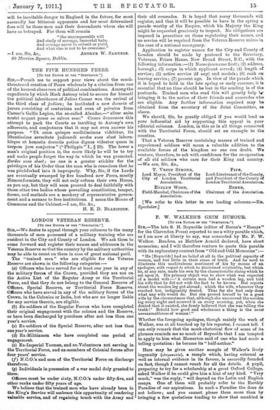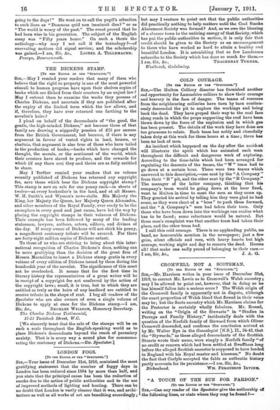F. W. WALKER'S GRIM HUMOUR.
[To THE EDITOR ON THE "SPECTATOlt."1
Sue,—The late S. H. Reynolds (editor of Bacon's " Essays " for the Clarendon Press) reported to me a witty parable which, as I am now at liberty to say, was concocted by Mr. F. W. Walker. Readers, as Matthew Arnold declared, have short memories; and I will therefore venture to quote this parable with its explanatory context from "Old and Odd Memories "
" He [Reynolds] had no belief at all in the political capacity of women, and but little in their sense of truth. And he used to illustrate this nnchivalrous sentiment of his by means of an apologue, with respect to which he disclaimed originality, but which he, at any rate, made his own by the characteristic stamp which he set upon it. His primary object was to show what was expected of a model wife:—' A certain man had a wooden leg, and told his wife that he did not wish the fact to be known. But reports about the wooden leg got abroad ; which the wife, whenever they reached her, indignantly denied. Thus far she had only done what any wife would do. But she proved herself to be a good wife by the circumstance that, although she unscrewed the wooden leg every night and screwed it on every morning, yet, when she denied that it existed, she firmly believed that she was telling the truth!' Behold how good and wholesome a thing is the sweet unreasonableness of woman !"
Whether the foregoing apologue, though mainly the work of Walker, was at all touched up by his reporter, I cannot tell. I can only remark that the mock-rhetorical flow of some of its phrases reminds me so much of Reynolds that I am tempted to apply to him what Hamerton said of one who had made a telling quotation: he became its "half-author."
Here may be given another sample of Walker's lively ingenuity (elorpaneh(a), a sample which, having external as well as internal evidence in its favour, is assuredly founded
on fact, though I cannot vouch for all the details. A pupil, preparing to try for a scholarship at a great Oxford College,
asked Walker if he could give him a hint of any kind. "Very much," was the reply, "will depend on the Latin and English essays. One of them will probably refer to the Earthly
Paradise of our aspirations. In such a Paradise the dons do not believe ; and you cannot please them more than by bringing a few quotations tending to show that mankind is going to the dogs!" He went on to call the pupil's attention to such lines as " Damnosa, quid non imminuit dies P" or as " The world is weary of the past." The event proved that he had been wise in his generation. The subject of the English essay was " Fifty years hence." On such a thesis the anthology—why may I not call it the toxicology ?—of enervating mottoes did signal service ; and the scholarship



















































 Previous page
Previous page